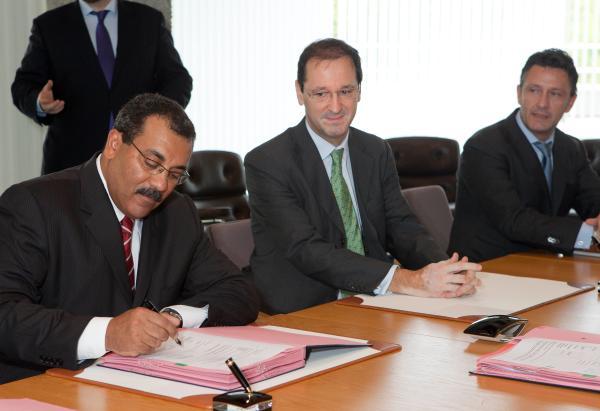
The European Investment Bank (EIB) is providing a EUR 500 million loan to The Brazilian Development Bank (BNDES) of Brazil for projects in the renewable energy sector supporting climate change mitigation.
The objective of this operation is to support investments that generate environmental benefits with respect to combating climate change. The majority of the schemes will contribute to reducing greenhouse gas emissions by generating renewable energy. Other schemes may focus on increasing energy efficiency, including in industrial applications, the heating and cooling sectors and in power generation or support investments for climate change adaptation.
The EIB’s Brazil Climate Change Mitigation framework loan will provide financing for small and medium-size investments in the renewable energy and energy efficiency sectors. The framework loan will be made up of a maximum of 25 investments schemes in the following sectors: energy and energy efficiency including small hydropower schemes (less than 30 MW), biogas- or biomass-fired heat and power plants, medium-scale hydroelectric power plants and wind farms, energy efficiency and climate change adaptation investments as well as manufacturing facilities for renewable energy equipment. The schemes will be located in Brazil. Under the eligibility criteria established in the signed loan agreement, BNDES will select from its portfolio the eligible projects and will submit them to EIB following the agreed allocation procedures.
This loan is provided under the EUR 4.5bn Energy Sustainability and Security of Supply Facility (ESF). This will be the first operation structured under the ESF in Brazil and the first Bank operation with BNDES, the Brazilian State development institution, which will on-lend the Bank’s financing to the final beneficiaries.
Background information:
The European Investment Bank (EIB) is the EU’s long-term financing institution promoting European objectives. Created in 1958, it operates in the 27 EU Member States and more than 130 other countries. Lending operations outside the EU are part of the EU’s cooperation policy with those countries. Since 1993 the Bank has carried out four successive lending mandates for Asia and Latin America. Under the current mandate (ALA IV), covering the period 2007-2013, the EIB is authorised to lend up to EUR 3.8 billion for financing operations that contribute to climate change mitigation or support the EU presence in those regions through foreign direct investment or the transfer of technology and know-how. The EUR 3.8 billion regional ceiling is broken down into indicative sub-ceilings of EUR 1 billion for Asia and EUR 2.8 billion for Latin America.
In addition to the mandate, the Bank is running a Facility for Energy Sustainability and Security of Supply (ESF), a multiannual EUR 4.5 billion facility aiming to reinforce the EIB’s contribution to renewable energy and energy efficiency in non-member countries. The facility is used essentially when the Bank does not need the support of the EC guarantee to mitigate sovereign or political risk to protect its own credit standing (i.e. in investment-grade countries or where appropriate security can be provided). In contrast, the resources under the external lending mandate would be used when the support of the Community guarantee is needed to mitigate sovereign or political risks (mostly in lower-rated countries) or to support projects in other sectors.
The Brazilian Development Bank (BNDES) is the main financing agent for development in Brazil. Since its foundation, in 1952, the BNDES has played a fundamental role in stimulating the expansion of industry and infrastructure in the country. Over the course of the Bank’s history, its operations have evolved in accordance with the Brazilian socio-economic challenges, and now they include support for exports, technological innovation, sustainable socio-environmental development and the modernization of public administration. The Bank offers several financial support mechanisms to Brazilian companies of all sizes as well as public administration entities, enabling investments in all economic sectors. In any supported undertaking, from the analysis phase up to the monitoring, the BNDES emphasizes three factors it considers strategic: innovation, local development and socio-environmental development.
In the 21st century, the BNDES aligns its operations with the reality of a globalized world, with economies deeply connected, and intensifies its efforts to take on roles and duties that surpass the borders of Brazil, in compliance with the increase of the international insertion of the country. Today, the Bank has offices in London, one of the most important financial centers and in Montevideo, considered the “capital” of the Mercosur trade bloc and head office for several regional organizations. The BNDES also finances the expansion of national companies far beyond the borders of the country and seeks to diversify the sources of its resources on the international market. In addition, the BNDES has strengthened its efforts that are already traditionally conducted, such as financing exports of Brazilian goods and services in projects carried out overseas and institutional fundraising through multilateral organizations, sharing experiences and promotion opportunities.
Press contacts:
BNDES: www.bndes.gov.br

Photographer: EIB ©To be defined
Download original

Photographer: EIB ©To be defined
Download original

Photographer: EIB ©To be defined
Download original

Photographer: EIB ©To be defined
Download original

Photographer: Imedia ©To be defined
Download original